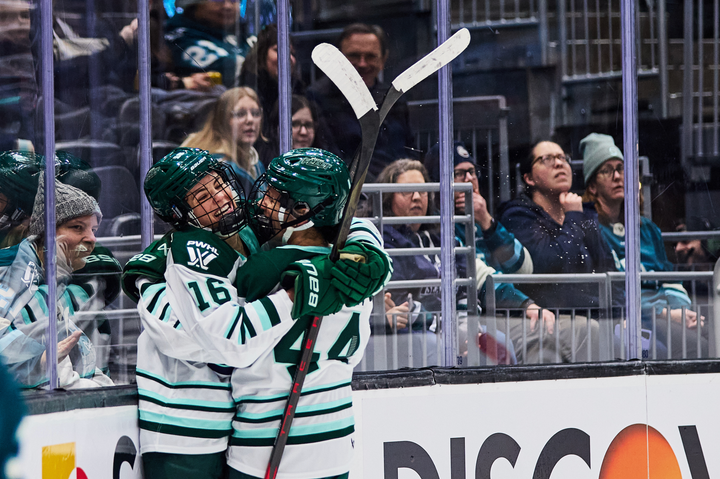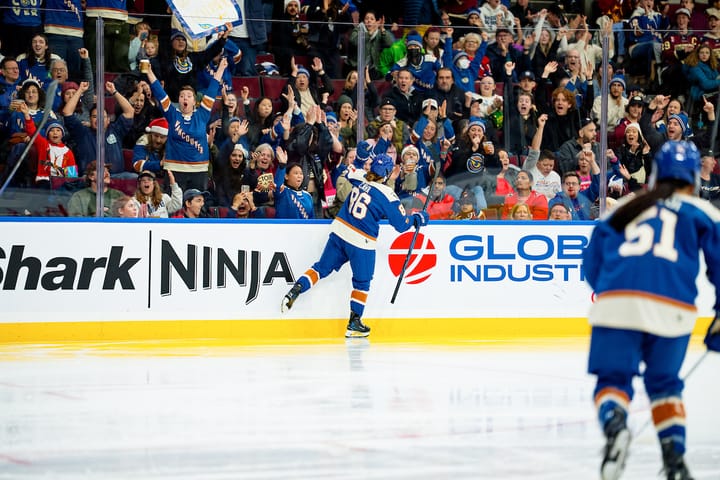CWHL and NWHL react to the Declaration of Principles
What the new initiative means for the future of the game
On Wednesday, 17 hockey governing bodies descended on New York City to launch the Declaration of Principles. Commissioners Brenda Andress and Dani Rylan of the CWHL and NWHL, respectively, were on-hand for the launch and two-day meeting of minds. Here is what you need to know about the launch and what this could mean for the future of hockey.
The facts
The Declaration of Principles is the culmination of roughly two years of conversations and tweaking led by Hockey Hall of Famer Pat LaFontaine.
Thank you, Hockey, for being more than a game. https://t.co/RDMgRUSf5L #ThisIsHockey pic.twitter.com/AMumv4d5Pq
— NHL (@NHL) September 6, 2017
In his role as the NHL vice-president of hockey development, he was tasked with drafting a plan to get key hockey stakeholders involved in the betterment of the sport.
“I think hockey, by doing this, and showing a united front and agreeing on the way our culture should be, the principles we should live by, [is] raising the standard of our sport. And, I’m proud to be a part of it,” said LaFontaine in a special video message played at the launch.
The Declaration of Principles states the following beliefs:
Hockey should be an enjoyable family experience; all stakeholders— organizations, players, parents, siblings, coaches, referees, volunteers and rink operators — play a role in this effort.
Hockey’s greatest value is the role it plays in the development of character and life skills.
All hockey organizations—regardless of size or level of competition — bring value to players and families in their ability to deliver a positive family experience.
Physical activity is important for a healthy body, mind and spirit.
There are significant benefits of youth participation in multiple sports.
Hockey programs should be age-appropriate for all players, accounting for each individual’s physical, emotional and cognitive development.
There is great value in all forms of hockey, both on and off the ice.
All hockey programs should provide a safe, positive and inclusive environment for players and families regardless of race, color, religion, national origin, gender, age, disability, sexual orientation and socioeconomic status. Simply put, hockey is for everyone
The 17 organizations who signed on are the American Collegiate Hockey Association, American Hockey League, Canadian Hockey League, Canadian Junior Hockey League, Canadian Women's Hockey League, College Hockey Inc., ECHL, Hockey Canada, International Ice Hockey Federation, North American Hockey League, National Collegiate Athletic Association, National Hockey League, National Hockey League Players Association, National Women's Hockey League, U SPORTS, United States Hockey League, and USA Hockey.
Insight from the Commissioners
After the press conference, The Ice Garden caught up with the commissioners of the CWHL, NHL and NWHL to discuss what the recent launch will mean for girls and women, as well as other (and often marginalized) groups in the hockey community.
Hockey has been the source of some of my biggest successes and hardest struggles, but always will be one of my greatest joys https://t.co/wXjlPVoG3C
— Elena Orlando (@e_orlando14) September 9, 2017
We spoke with Dani Rylan of the NWHL first, who reflected on the process that led to Wednesday’s announcement.
“Pat LaFontaine has been working on these principles for two and a half years now and they’ve evolved so much over the last two and a half years,” said Rylan. She added, “There’s always a lot of work to do to be held accountable and to be part of the process is truly an honor and we’re excited to accept that challenge.” She noted the NWHL was proud to get the call to sit at the table for the next two years and contribute to a plan of action.
When we asked what the NWHL hopes to contribute to move the principles from thought to action, Rylan commented, “One of the greatest things about sport is that we can tackle all of these societal issues and conversations and use sport as a safe platform to have those discussions. These principles are really a part of the NWHL’s fabric since our inception.”
Brenda Andress of the CWHL agreed. “Some of the things [the declaration] is recognizing we’ve been doing. We’ve started to do that and we, because we’re at the grassroots level, and we started in a different era, those were the things that were important to us.” The press conference and the first meeting of the 17 organizations that followed the next day is an opportunity to bring some of those practices to a larger audience. Additionally, it’s an opportunity for all the organizations to take a look, collectively, at things that can be changed.
Andress added, “I think the opportunity tomorrow is to take a look at, what are our policies? What are our rules? And what are some of those policies and rules that might be hindering us ... I think that’s the opportunities that lie ahead of us.”
When asked how the Declaration of Principles will benefit girls and women in hockey, NHL commissioner Gary Bettman responded, “the message we hope to deliver is that not only is playing hockey something that should be fun, but it can teach great values and life lessons that will make a difference in a person’s life ... and these are important values to [the] young people.”
When asked what Rylan and Andress being involved in the initiative could mean for incorporating women’s hockey into the #ThisIsHockey narrative, Bettman said, “Well, we’re huge supporters of the women’s game and we want to see it continue to grow.”
Final thoughts
After the event, the stakeholders present seemed hopeful that the hockey community is headed in the right direction. At the press conference a letter from Pope Francis was read, and afterward Forbes magazine alluded the Declaration of Principles should be a staple for all professional leagues.
From a women’s hockey perspective, the #ThisIsHockey initiative will do well to show its all in with more than words. Bringing the CWHL and the NWHL to the table is certainly a first step. However, just inviting women is not the same as engaging women. At the press conference, fans were able to hear from three current NHL players, but not any current CWHL or NWHL players. Additionally, Cassie Campbell-Pascal and A.J Mleczko were both (like Andress and Rylan) recognized at the event, but were not given the opportunity to offer a statement of support for the principles.
The sport of hockey need not look far into its history to recount missed opportunities to make women, people of color, or players and fans who identify as LGBTQ feel as though hockey is for everyone. Additionally, the expense of a sport like hockey make economic status another barrier.
Stakeholders at the event did address the latter, as well as ensuring that hockey is enjoyable at all levels, not just elite feeder systems.
“It’s really about aligning the entire vertical from the grassroots level all the way to the pros and even beyond that,” said Rylan. She hopes the NWHL can honor the third principle, “Getting moms and dads playing hockey for the first time as adults as well and being able to learn those lessons to teach their kids and make it a real family sport. I think that’s one of the reason’s that we’re really excited to have Hayley [Moore, Deputy Commissioner] in her position is to help us align that vertical on the girls side.”
Hockey can be played anywhere. #ThisIsHockey https://t.co/1dd5dpCEeT pic.twitter.com/UMJiYRndUN
— CWHL (@TheCWHL) September 7, 2017
The CWHL also wants to continue to make the game more accessible.
“I’m working with a group of girls from India who play three or four times a year on a river," said Andress. “I’m so amazed at how the strength of women from around the world, it’s just their voices aren’t heard yet. So, our job is to get those voices heard and know it is for everybody on a level that is not what society sometimes thinks.”
As the 17 organizations continue to meet, it will interesting to see if and how the hockey community embraces the voices of CWHL and NWHL hockey players who continue to remind people that #ThisIsHockey means them and their fans too.





Comments ()